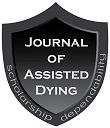Journal of Assisted Dying, vol. 1, no. 1, pp. 7-19
Neonatal deaths under Dutch Groningen Protocol very rare despite misinformation contagion
Author(s)
Neil Francis
Journal
Journal of Assisted Dying, vol. 1, no. 1, pp. 7–19.
Abstract
The Groningen Protocol specifies criteria for the potential termination of life in severely ill newborns in extremis with untreatable and unrelievable conditions. In September 2006 the Netherlands formally adopted a Regulation incorporating the Protocol. Despite the Regulation’s development through extensive professional consultation, endorsement by the Dutch Paediatric Association, empirical data showing a decrease rather than increase in use, and research showing that neonatal euthanasia occurs around the world in the absence of regulation, the Dutch Regulation has sparked controversy. More recently it has been claimed that hundreds of babies a year are killed under its provisions. Forensic analysis reveals the claim to be comprehensively and evidentially false. Wide online dissemination of the claim by mostly religious sources demonstrates confirmation bias and misinformation contagion.
Article keywords
Netherlands, Groningen Protocol, neonatal euthanasia, palliative sedation, neuromuscular blocker, non-treatment decision, confirmation bias, misinformation contagion, religion
Full PDF
Download the full PDF:  (230Kb)
(230Kb)
Citation
Francis, N 2016, 'Neonatal deaths under Dutch Groningen Protocol very rare despite misinformation contagion', Journal of Assisted Dying, vol. 1, no. 1, pp. 7-19.
Download the citation in RIS format: 

